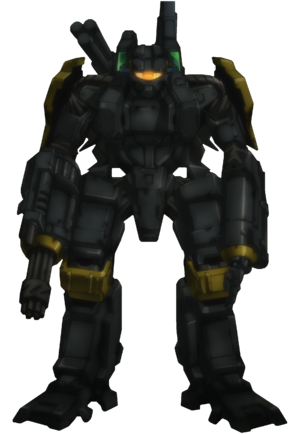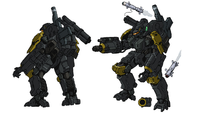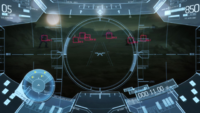HRUNTING/YGGDRASIL Mark I ADS: Difference between revisions
From Halopedia, the Halo wiki
BaconShelf (talk | contribs) m (→Trivia) |
|||
| Line 47: | Line 47: | ||
Despite its effectiveness, the idea was mainly scrapped, as the user was very vulnerable and it was too complicated for use on the limited number of SPARTAN-IIs.<ref>'''Halo Legends''': ''Prototype'' developer commentary</ref> | Despite its effectiveness, the idea was mainly scrapped, as the user was very vulnerable and it was too complicated for use on the limited number of SPARTAN-IIs.<ref>'''Halo Legends''': ''Prototype'' developer commentary</ref> | ||
During the [[Algolis Invasion]], the prototype exoskeleton was ordered destroyed under the [[United Nations Space Command Emergency Priority Order 098831A-1|Cole Protocol]]. Despite this order, the Marine known as [[Ghost (Marine)|Ghost]] took control of the exoskeleton to use it to buy escaping Marines and civilians time to escape for the duration of the self-destruct sequence. The exoskeleton took heavy damage, but Ghost completed his mission. Once the timer ran out, Ghost activated the self-destruct, obliterating all of the nearby Covenant forces in a nuclear explosion.{{Ref/Reuse|waypoint}} | During the [[Algolis Invasion]], the prototype exoskeleton was ordered destroyed under the [[United Nations Space Command Emergency Priority Order 098831A-1|Cole Protocol]]. Despite this order, the Marine known as [[Ghost (Marine)|Ghost]] took control of the exoskeleton to use it to buy escaping Marines and civilians time to escape for the duration of the self-destruct sequence. The exoskeleton took heavy damage, but Ghost completed his mission. Once the timer ran out, Ghost activated the [[self-destruct]], obliterating all of the nearby Covenant forces in a nuclear explosion.{{Ref/Reuse|waypoint}}{{Ref/Film|HLeg|Story=[[Prototype]]}} However, not all data on the Mark I ADS was lost when Algolis fell, leading to the creation of the [[HRUNTING/YGGDRASIL Mark I (J) Green Machine|"[J]" variant]] of the suit.<ref>[https://www.halowaypoint.com/en-us/news/folks-need-heroes '''Canon Fodder 98.2:''' ''Folks Need Heroes'']</ref> | ||
The HRUNTING and YGGDRASIL projects would continue to develop subsequent Armor Defense Systems. This work resulted in a number of different armor systems, including the [[HRUNTING/YGGDRASIL Mark II (D) Geyrion|Mark II [D] Geyrion]], [[HRUNTING/YGGDRASIL Mark II (J) Colossus|Mark II [J] "Colossus"]], and [[HRUNTING/YGGDRASIL Mark IX Armor Defense System|Mark IX "Mantis"]].<ref>[http://www.halowaypoint.com/en-US/halo4guide '''Halo 4 Interactive Guide''']</ref> [[Colonel]] [[James Ackerson]] was evidently involved with this program.<ref>'''Halo: Fall of Reach - Invasion''', ''Issue 2''</ref> | The HRUNTING and YGGDRASIL projects would continue to develop subsequent Armor Defense Systems. This work resulted in a number of different armor systems, including the [[HRUNTING/YGGDRASIL Mark II (D) Geyrion|Mark II [D] Geyrion]], [[HRUNTING/YGGDRASIL Mark II (J) Colossus|Mark II [J] "Colossus"]], and [[HRUNTING/YGGDRASIL Mark IX Armor Defense System|Mark IX "Mantis"]].<ref>[http://www.halowaypoint.com/en-US/halo4guide '''Halo 4 Interactive Guide''']</ref> [[Colonel]] [[James Ackerson]] was evidently involved with this program.<ref>'''Halo: Fall of Reach - Invasion''', ''Issue 2''</ref> | ||
Revision as of 14:23, February 18, 2024
| HRUNTING/YGGDRASIL Mark I ADS | |
|---|---|

| |
| Production information | |
|
Manufacturer: |
|
|
Role: |
Heavy combat |
| Specifications | |
|
Powerplant: |
Fusion reactor |
|
Hull: |
|
|
Armament: |
T261 Lucifer Arm-Mounted Gatling Gun (1), LAU-1810/SGM-151 missile tubes (5), |
|
Crew: |
1 operator |
| Service information | |
|
Affiliation: |
|
The HRUNTING/YGGDRASIL Mark I Prototype Armor Defense System,[1] known simultaneously as HRUNTING and YGGDRASIL,[2][3] was an experimental bipedal powered exoskeleton/armored fighting vehicle developed by the Materials Group at Weapons Research Facility T12A on Algolis. It was intended for use by the UNSC Marine Corps.[2]
Overview
Project YGGDRASIL and Project HRUNTING were both initiated by the Office of Naval Intelligence in the early to mid 26th century, under the direction of Vice Admiral Danforth Whitcomb.[2][3][Note 1] YGGDRASIL was an umbrella name for initiatives that aimed to re-engineer Project MJOLNIR technologies for use in other UNSC vehicles.[4] Meanwhile, HRUNTING was a project best known for the HRUNTING Mark III (B) Cyclops, another powered exoskeleton.[5] Decades after the creation of the Cyclops, the same Algolis-based group behind that exoskeleton would unite the advancements made by both projects to create the HRUNTING/YGGDRASIL line of exoskeletons, including the prototype HRUNTING/YGGDRASIL Mark I ADS.[3][5]
Despite its effectiveness, the idea was mainly scrapped, as the user was very vulnerable and it was too complicated for use on the limited number of SPARTAN-IIs.[6]
During the Algolis Invasion, the prototype exoskeleton was ordered destroyed under the Cole Protocol. Despite this order, the Marine known as Ghost took control of the exoskeleton to use it to buy escaping Marines and civilians time to escape for the duration of the self-destruct sequence. The exoskeleton took heavy damage, but Ghost completed his mission. Once the timer ran out, Ghost activated the self-destruct, obliterating all of the nearby Covenant forces in a nuclear explosion.[2][7] However, not all data on the Mark I ADS was lost when Algolis fell, leading to the creation of the "[J]" variant of the suit.[8]
The HRUNTING and YGGDRASIL projects would continue to develop subsequent Armor Defense Systems. This work resulted in a number of different armor systems, including the Mark II [D] Geyrion, Mark II [J] "Colossus", and Mark IX "Mantis".[9] Colonel James Ackerson was evidently involved with this program.[10]
Features
The HRUNTING/YGGDRASIL suit was powered by a nuclear fusion reactor. Unlike the MJOLNIR family of powered assault armors, the user did not need to possess physiological augmentation to wear the armor. Though the HUD was rather similar to that of the MJOLNIR, the HRUNTING/YGGDRASIL Mark I's integrated weapon system and improved target assessment negated the need for a neural interface link. The suit used simple laser and radio technology for communications. Unlike the MJOLNIR, the suit did not recycle fluids. Overall, the HRUNTING/YGGDRASIL Mark I was much more expensive to manufacture than the MJOLNIR, which meant that it saw very limited production.[2][11]
Armament
The main strength of the suit lay in its myriad of weapon systems, each integrated directly into the infrastructure of the exoskeleton. The right arm ended in the 850-round, six-barreled T261 Lucifer Arm-Mounted Gatling Gun which possessed an integrated targeting system. A rather large-barreled grenade launcher was mounted on top of the gatling gun with what appeared to be the ammunition belt wrapped around the base. The right shoulder was topped with a tri-barreled LAU-1810/SGM-151 missile launcher that fired heat-seeking missiles. An M149 Magellan Recoilless Rifle was mounted on the left shoulder, which had to be manually aimed by the operator. The suit carried fifty explosive 105mm rounds for the M149, each with a five-meter blast radius.
The suit's left arm ended in a mechanical hand used to both operate weapons and manipulate external objects with ease. Two additional missile tubes were attached to the forearm and were packed the same type of missiles used on the shoulder-mounted cluster. Three Type 18 Magnetic/Bayonet-style Claymores explosives were attached to each thigh, each with enough power to completely engulf a Wraith tank in the blast.
HRUNTING/YGGDRASIL Mark I also featured a 300-megaton, lead-tampered nuclear fission self-destruct device which used the components of the suit's fusion reactor. Activating the self-destruct sequence would begin a staggered, codeword-activated countdown. Because such a system violates several military conventions regarding "kamikaze-style" actions, the device's purpose is still officially considered a "security" contingency. The codeword is written on the HUD for the wearer to read before activation.[2]
Equipment
The suit made use of a number of high-tech innovations to operate efficiently in combat. One of these improvements was an integrated jetpack used for powered flight. This jetpack uses a total of four stabilizers and four afterburner thrusters located on the front and back of the suit. Directional control seems to have been provided by shifts in balance by the operator. When not in use, the pack's thrusters folded into slots in the suit to protect from external damage. Another useful addition was the incorporation of the core technology behind the Office of Naval Intelligence's reverse-engineered bubble shields. The dynamic nature of the shield makes it automatically engage when the suit comes under fire. However, the suit lacks the constant, form-fitting energy shields used by the MJOLNIR armor systems.
Variants
- HRUNTING/YGGDRASIL Mark I (J) Green Machine: A variant of the HRUNTING/YGGDRASIL Mark I ADS.[12]
Trivia

|
Browse more images in this article's gallery page. |
- Hrunting is a magical sword given to Beowulf in the Anglo-Saxon poem of the same name. Beowulf tried to use it to kill Grendel's mother but it proved insuffient, forcing the hero to use another blade, forged by giants, to slay her.
- Interestingly, the armor's motion sensor uses yellow dots to represent hostile contacts, as opposed to MJOLNIR's motion sensor, which uses red dots for hostiles and yellow for friendly forces.
- In Halo Mash-Up: Minecraft Evolved, the Iron Golem mob is retextured to look like the prototype suit.
Gallery
Concept art of the HRUNTING/YGGDRASIL suit for Halo Legends: Prototype.
The suit's heads-up display.
The HRUNTING/YGGDRASIL Mark I in the Midnight in the Heart of Midlothian motion comic.
The HRUNTING/YGGDRASIL Mark I in Halo: Fall of Reach.
List of appearances
- Halo Legends
- Prototype (First appearance)
- Halo Evolutions - Essential Tales of the Halo Universe
- Halo: Fall of Reach
- Halo Wars 2
Notes
- ^ Halo Waypoint's page on the armour, circa 2012, claims that the HRUNTING and YGGDRASIL projects were one and the same. However, most other sources treat them as separate, and so this page does the same.
Sources
- ^ Halo.Xbox.com: This Week’s Halo Waypoint Schedule (source defunct)
- ^ a b c d e f Halo Waypoint, Prototype (Retrieved on Sep 5, 2012) [local archive] [external archive]
- ^ a b c Halo Waypoint: Algolis (defunct, backup on Archive.org)
- ^ Halo Waypoint - Universe, Mantis
- ^ a b Halo: The Essential Visual Guide - Cyclops, Page 44
- ^ Halo Legends: Prototype developer commentary
- ^ Halo Legends - Prototype
- ^ Canon Fodder 98.2: Folks Need Heroes
- ^ Halo 4 Interactive Guide
- ^ Halo: Fall of Reach - Invasion, Issue 2
- ^ Halo.bungie.org: Re: End of Prototype *Legends spoils*
- ^ Halo Wars 2: Phoenix Logs - Sergeant Johnson







